As the summer draws to a close (officially, it ends today for me), I’ve been frantically preparing to teach the Needle Arts class I mentioned a while back. I really appreciate everyone’s feedback on the subject – your comments were very encouraging and really helped get me fired up about the class!
“Needle Arts” is probably a misnomer, and I may discuss this with the school a bit later. My brief exposure to other needle arts besides embroidery is minimal – I can crochet, but I don’t do it much; I can knit only the simplest stitches; and aside from occasional needle tatting (in conjunction with needle lace), I don’t tat. In fact, mostly, I just embroider. (You’ve probably noticed that!) My focus, then, for the class, is only embroidery of various types. The first quarter is devoted to counted techniques, including cross stitch, blackwork, Assisi work, and petit point. The remainder of the year is devoted to learning stitches and applying the knowledge in various surface embroidery techniques. I won’t go into all the gory details right now, but said techniques will include, especially, crewel work and silk work.
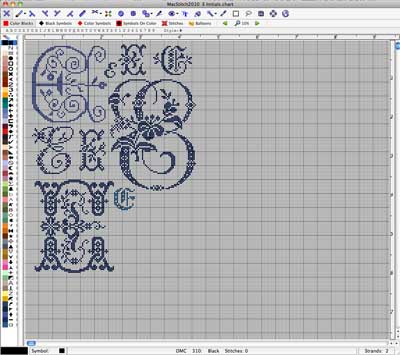
During the first semester, though, as far as the technique portion of the course is concerned, the students will be primarily learning stitches, first counted and then surface. They will incorporate the stitches into spot samplers. To this end, I’m putting together collections of cross stitch monograms so that the students can apply them to their samplers. They’ll have plenty of styles of monograms to choose from, to personalize their samplers. And then they’ll have plenty left over, for future projects if they want to use them.
I’m using MacStitch, which is an excellent and easy program for designing counted work. (If you don’t use a Mac, they have a Windows version…) The monogram designs I’m using are the old Sajou monograms that are offered on Pattern Maker in a variety of downloadable versions, one of which is MacStitch.
During the first quarter, we’ll be looking at the history of samplers, as well as the origins of materials and the different types of fibers. During the hands-on part of the course, the students will have a chance to use different fibers in different ways. They’ll be keeping a “Needlework Journal” that has space for samples, notes, instructions, and so forth, so that they can note types of threads, fabric, and stitch results and variations. Besides individual small samples, they’ll practice and elaborate on their samplers. By the end of the first semester, the students will have been exposed to a lot, as far as both information and stitching is concerned.
It’s during the second semester that the students will be working individual projects from start to finish. I’m of the opinion that it is difficult (if not impossible) to design projects and work them until you have an idea of the stitches and the materials of embroidery. It makes more sense to design and execute projects once you know something about stitches and embroidery materials. Hence the reasoning behind a semester devoted to basics, followed by a semester of application. The point, though, is not to have a “survey course” where students learn a skimming of everything, but rather a skills course, where they can actually spend time developing certain skills well, with a little depth.
I’m excited about teaching the class! But at this point, I could really use an extra week of preparation! Where did the summer go? Is it really true that time goes faster, the older we get? I think it must be – because I swear summer just started last week! Still, the school year must begin, and I suppose it will, whether I’m ready for it or not. Wish me luck, will you?!

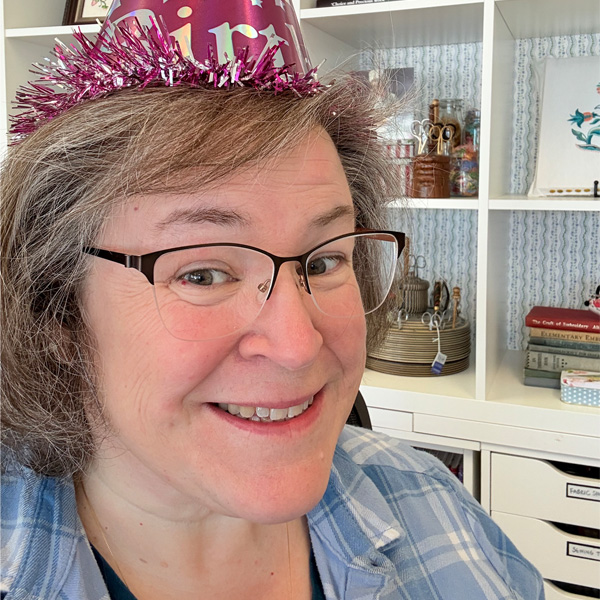

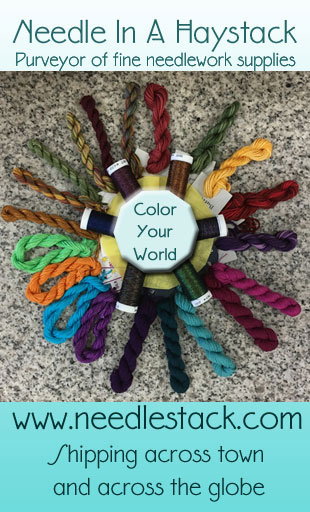
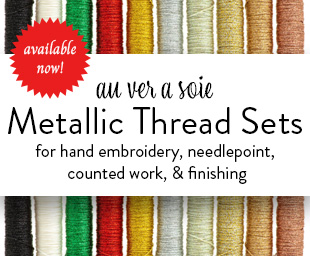
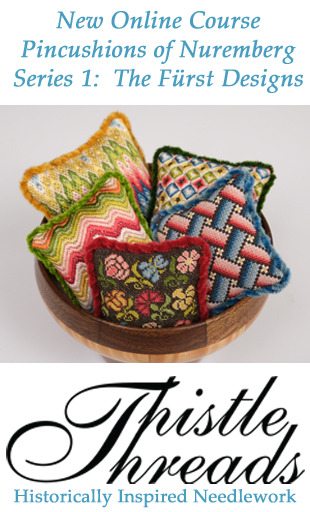
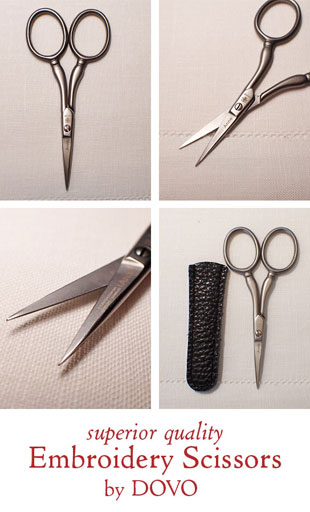
Hi Mary!
It all sounds great and I think you’re going about it in totally the right way. I couldn’t agree more that the students need to have some technical skill behind them before they can start designing and that’s what I didn’t like about the City & Guilds class I did. It was categorised as ‘suitable for beginners’, but you really needed either extensive design experience or a good grounding in stitchcrafts in order to be able to do well and not feel stressed. I had the latter, at least to some degree, but I still felt a bit overwhelmed on a regular basis!
I love the idea of including some background info as well. Wish I could come to your class. I’m sure your students will have a great year with you and do post some photos if and when you can.=)
Good luck, Mary! It sounds like it’s coming along nicely. Also, I’d like to say that if anyone else uses Linux, kxstitch is a great free program for cross-stitch design 🙂 http://sourceforge.net/apps/mediawiki/kxstitch/
Viel Gluck Mary! This sounds like a wonderful course and I absolutely agree with your general outline – skills then design. It’s exactly how we teach music – teach the skills, give students loads of ways to practice those skills and then application in larger context. We start school tomorrow as well…the summer did fly by and, yes, time does go more quickly as we get older! Have a great year!
Mary you are going to do GREAT! I am so jealous of these kids – I’d like to be in this class. Learning the fundamentals and then a project in an organized, controlled setting – sounds like a plan! Very very jealous!
Your class is going to be so much fun and I do envy those kids. Good luck and do keep us updated on your class progress from time to time.
Good luck! (And WOW am I jealous of your students for that opportunity . . .)
This sounds so exciting! I hope you have a lot of kids sign up. Wouldn’t it be great if you got some boys, too?
Mary,
I am enjoying your postings and will be following with real interest your teaching at a school.
Two member of my EGA group have taught at the fourth grade level once a week for a four weeks.
I will make sure they know of your endeavor. they really enjoyed the experience.
Good Luck!!
Mary, your class sounds wonderful. I would be interested in seeing how you have your students organize their Needlework Journals. Please share more with us as the year progresses.
Mary, I hope you will share your progress as well as your students’ progress throughout the year. The needlework journal sounds like something the students will treasure in to the future. It sounds like a great class.
Oh, where oh where is this magical class? Last week was my birthday and I made the wrong wish! Your work is beyond wonderful and I so look forward to your blog posts. Thanks for your generous sharing. Jane
Dear Mary,
Oh this sounds like a wonderful class. I wish I could attend as well. It would be wonderful if you could have an online art show of the student’s work at the end of the school year. I would love to see their finished projects.
Best of luck with the new school year. And I agree, the time does go by much faster as you age…good thing I am only 29. LOL!
So when are you going to do an adult’s version, on-line? I’m not entirely kidding – your class prep sounds great, and you are such a great teacher.
But then again, your blog is one giant on-line class 🙂
Good luck, Mary! I am jealous of the kids taking the class. I wish there had been those kids of electives when I was in school. I agree with Elmsley Rose…….an online adult class would be great! I do embroidery but I would love to learn crewel from someone who knows what they are doing……..needlepainting would be awesome.
Have a great school year.
Hi Mary, once again, congratulations on being asked to teach needle arts at school. I want to also say Thank You for inspiring me – again – to take certificate courses through my Embroiders Guild. There is a practical based certificate for all the embroidery skills and also a design certificate in which the embroiderer must design an item from start to finish. Four certificates, one of which MUST be design, and the student may then apply and complete the Diploma of Teaching.
So after reading previous posts concerning your new venture, I looked into the cerificates in more detail and I will start one next year.
I am not sure where this will end up, but to be paid to teach my hobby has to be a great way to earn a living.
Mary, I’m sure your class will be very well received. Your work and instructions here are amazing!
I have a question: Which of the books you have listed (or that are not yet listed) would you recommend for someone lookiong for antique Jacobean designs? I am interested in drafting my own designs inspired by actual antique needleworks instead of using someone else’s patterns. Thank you!
Do keep us up with this Mary. If you don’t have time then give it to the students to do for homework!
Have looked up the MacStitch and the Sajou monograms/Patern Maker sites. These monograms are so tantalizing and inspirational. I was captured immediatly by the ‘es’ you have illustrated here.
Cheers, Kath
I would have LOVED this course if it were available when I went to school!! How many students do you have enrolled in it?
I would have loved something like this in school. I learned cross stitch pretty early on, but it wasn’t until high school that I really felt the need to do something more complex, and now I just LOVE embroidery 🙂 Your site has been great for learning new tricks and techniques 🙂
I look forward to reading more on how the class is going! I don’t remember if I would have loved a class like this when I was in high school. I do remember doing embroidery and crewel back then, but I may have had more interest in horses at the time. I’d definitely be interested now though. Thanks for the pointer to the Sajou patterns also.
Lucky students! Iwish Ihad had some inspired needlework teaching back then: I thought it was just BOOOOORING! My mom used to make cross-stitch stuff, which I loathed, (still do), and my grand-grand-mother whitework, which was passed on to me as a gift looked way too difficult toembark in. So I only began stitching very recently. You students have a great opportunity. I hope they realize it!
About dictionaries: Ispent themorning binding together the vol. 1 and 2
oooops, comment posted itself before Ifinished typing!! I apologize!
… vol 1 and 2 of the A-Z of Embroidery Stitches: I could never remember which stitch was in which volume, that way, Ialways have them both in hand (and less cardboard in the stitching bag 🙂 )
You are giving these students a great foundation. i wish I had learned embroidery in such an organized fashion. I would love to be siting in this class with these students. It is too bad you can’t offer it it online for us. Good luck with the class. I hope you will give us regular updates.